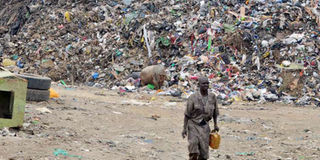Land grabbers and filthy cities are killing our children

Kibarani dump in Mombasa. PHOTO | KEVIN ODIT | NATION MEDIA GROUP
What you need to know:
The more democratic any society becomes the more public funds will be spent on shared spaces, healthy environments and public safety.
Small improvements like providing footpaths, play areas or green parks must be commended and encouraged.
However, very little of devolution funds have been spent in these sectors that can make cities more beautiful, attractive and safe.
The battle for life on earth will be won or lost in cities.
Right now we are losing that fight and our people are dying prematurely.
Tourist arrivals may be on the rise, but on first impressions many may wonder about the wisdom of choosing Mombasa for rest and relaxation. Kibarani may be the gateway to the island and ocean, but the choking smoke and filthy stench from the nearby dump is dangerous, hazardous and probably poisonous. Yet it’s what every arrival first encounters.
For the past three years, the Mombasa County Government has spent a fortune on hired trucks and dumpers, depositing garbage and most likely toxic waste in the ocean while levelling the site. But nothing has improved. Visitors pass a few more horribly filthy dumps before reaching their beach hotel, but residents of Kibarani are being poisoned daily. Children in St Francis School have extremely high rates of respiratory illnesses resulting from breathing polluted air every minute of their tender, young lives.
Nema does not care and Kenyans have long ago since up on this most useless of institutions established to safeguard their environment. That is Mombasa, but it could be any urban centre in Kenya. Think of Nairobi’s Dandora dumps or the Kisumu ones. More than half of the world’s population now resides in cities and more than 50 per cent of Kenyans live in urban centres. However, most are filthy, unhealthy, overcrowded and unplanned settlements. They are monuments to greed and corruption as every urban settlement and development plan is sacrificed on the altars of expediency and capitalism. It’s profit before people.
GREEN INITIATIVES
Kenyans, however, will eternally be grateful to Wangari Maathai for her green initiatives and for saving Uhuru Park. Now, Nairobi Senator Mike Mbuvi wants to convert the largest green, public area in the city into a bus park. Our politicians have no notion of the benefits of green cities. They should listen to Pope Francis, who says about urban squalor: “We were not meant to be deprived of physical contact with nature.”
Politicians cannot grasp the interconnectedness between shared spaces and human behaviour. Green areas and shared public spaces greatly enhance the quality of life, produce safer neighbourhoods and improve the physical and mental health of everyone. No wonder teenagers turn to crime and radicalism if they have nowhere to play or meet.
London has a population of eight million, but 40 per cent of the city is green space. There are 142 parks, covering 1,600 square kilometres. Turn any corner in the bustling city and you find beautiful parks, playgrounds, sports fields and recreational spaces. That commitment to the common good was the best aspect of colonialism, but their urban plans have long since been decimated. Where are the shared spaces in our urban centres? Even areas set aside for public use in new estates have been grabbed by ‘developers’.
The more democratic any society becomes the more public funds will be spent on shared spaces, healthy environments and public safety. Small improvements like providing footpaths, play areas or green parks must be commended and encouraged. However, very little of devolution funds have been spent in these sectors that can make cities more beautiful, attractive and safe.
The battle for life on earth will be won or lost in cities. Right now we are losing that fight and our people are dying prematurely.
[email protected]; @GabrielDolan1





